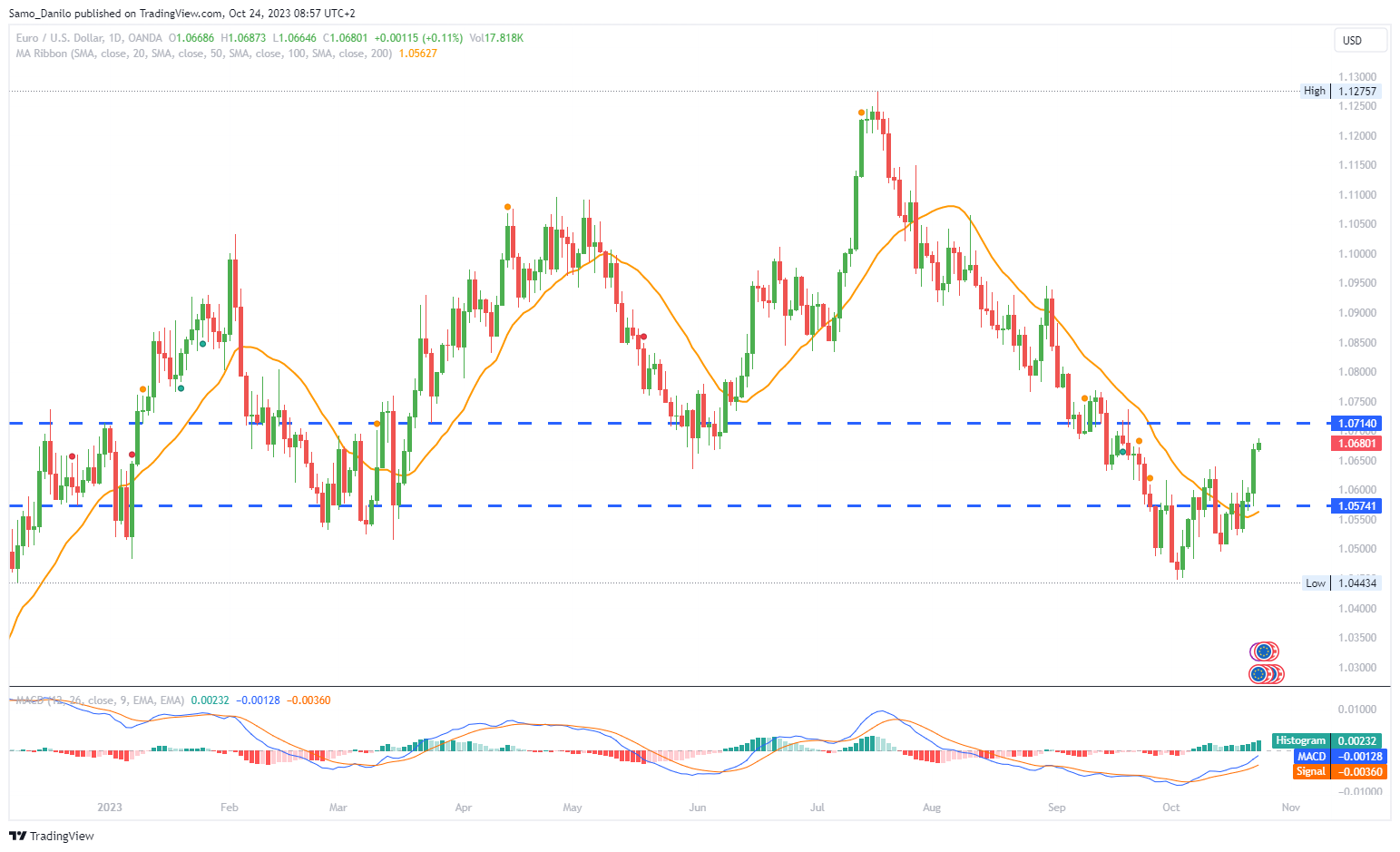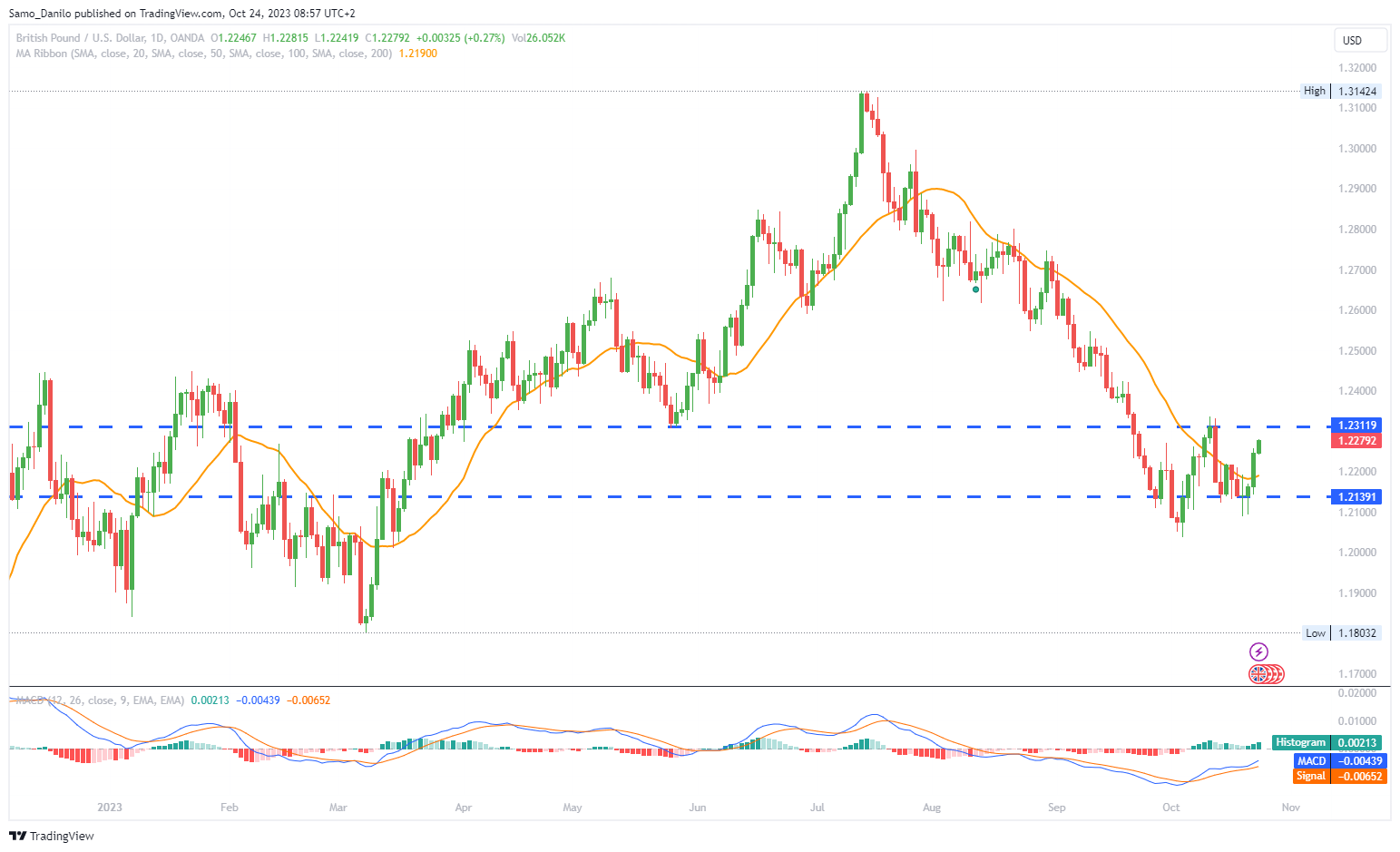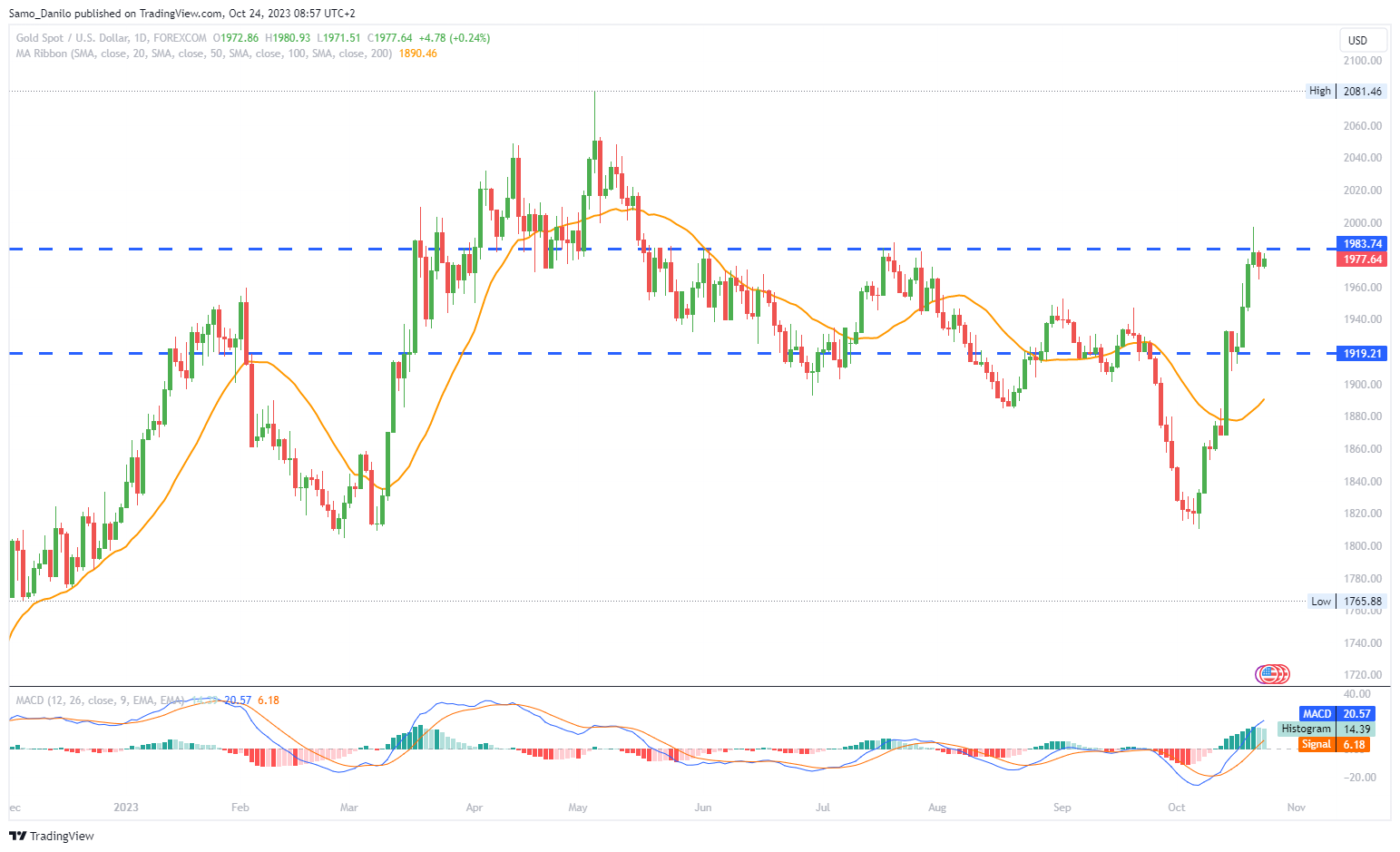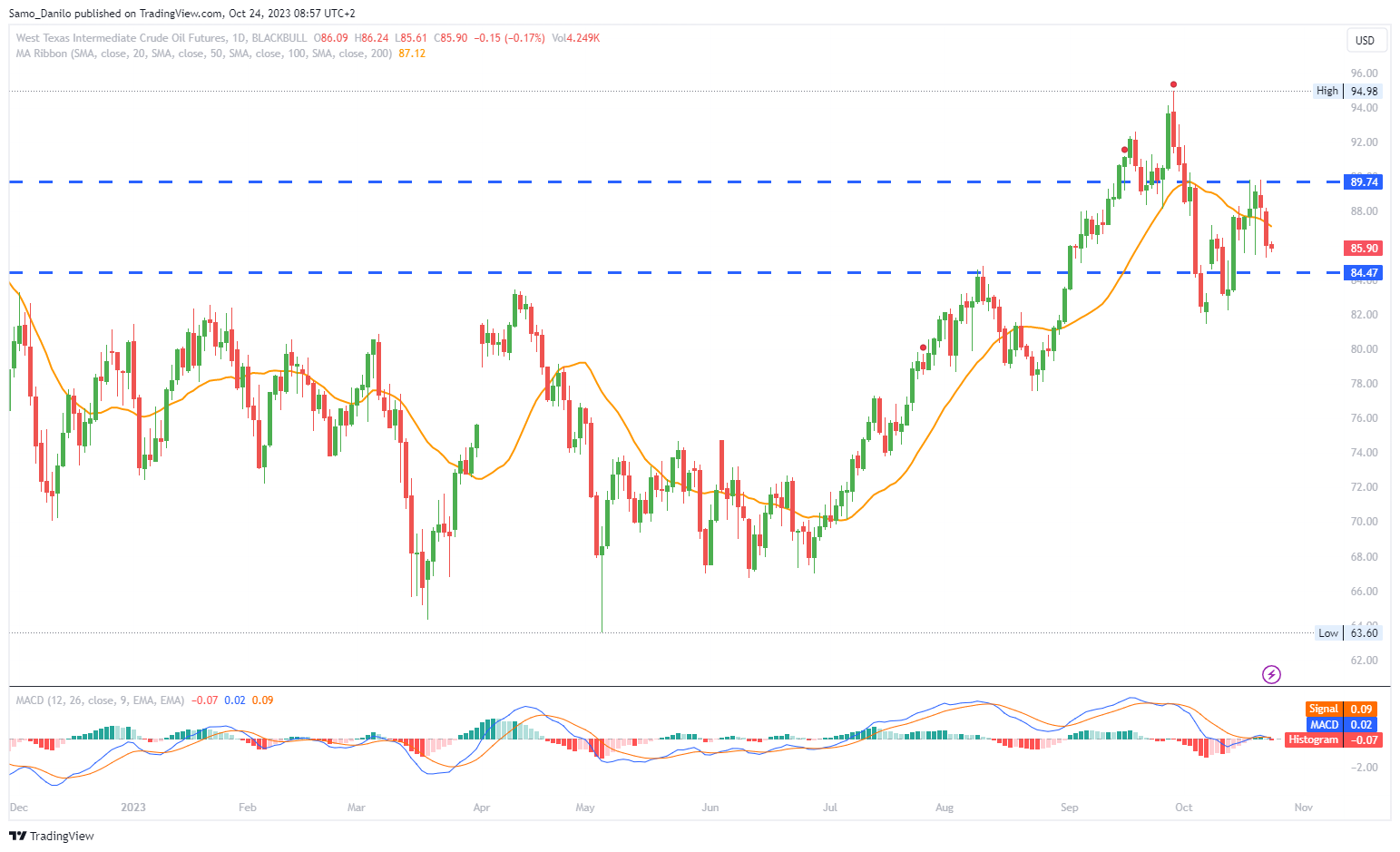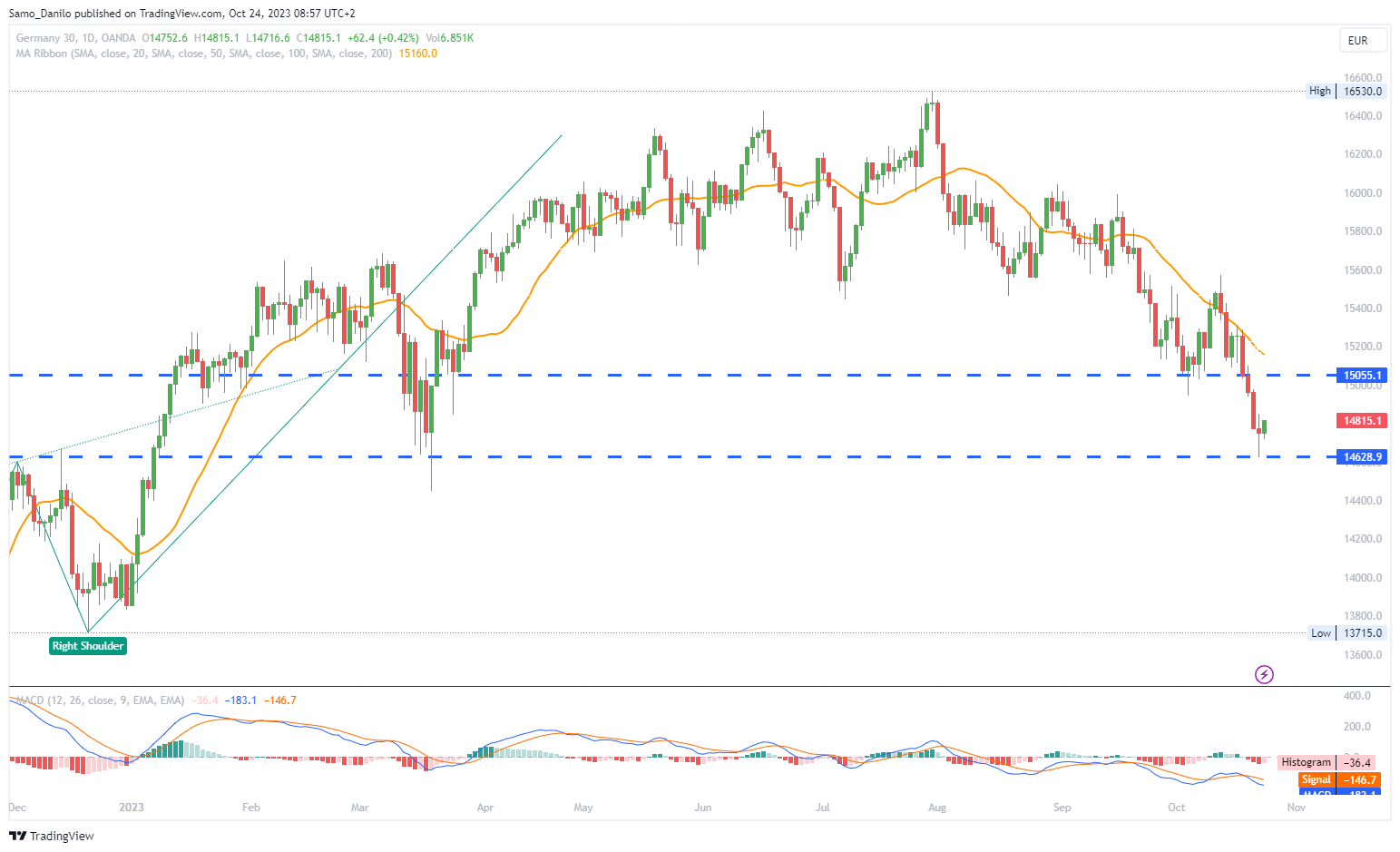EURUSD
- EUR/USD showed significant strength on Monday, primarily driven by a weaker US Dollar. The pair broke a downtrend line and surged to around 1.0687, marking its highest level in a month.
- The US 10-year Treasury yield experienced noteworthy volatility. It initially rose above 5.00%, but this increase was quickly reversed, leading to a sharp fall to 4.84%. This decline pushed the US Dollar index down to 105.51, its lowest intraday level since September 22.
- On the data front, Eurozone consumer confidence figures showed a slight decline in October compared to September. A flash estimate indicated that consumer morale in the Eurozone dropped to -17.9 this month from -17.8 in September.
- Looking ahead, Eurozone and US PMI data are scheduled for release on Tuesday. The consensus suggests a minor improvement in the Euro area and a slight decline in the US.
- Later in the week, the European Central Bank (ECB) will hold its monetary policy meeting on Thursday. This event coincides with the release of significant US economic indicators, including GDP data and the Federal Reserve's preferred inflation gauge.
Closing statement:In summary, the EUR/USD pair made significant gains on Monday, largely due to a weakening US Dollar and a reversal in US 10-year Treasury yields. Despite a slight dip in Eurozone consumer confidence, market attention turns to upcoming PMI data and the crucial ECB meeting, accompanied by key US economic indicators later in the week.
GBPUSD
- GBP/USD is trading near 1.2300 during the early European session on Tuesday. The pair is benefiting from a weaker US Dollar and a shift in risk sentiment towards a positive outlook.
- UK Retail Sales data for September showed a 0.9% decline on a monthly basis, according to the UK's Office for National Statistics. This result was below market expectations, which anticipated a smaller 0.1% decrease. This weaker-than-expected retail sales data put pressure on the Pound Sterling (GBP).
- Bank of England (BoE) Governor Andrew Bailey mentioned in an interview with Belfast Telegraph that he expects a "marked fall" in inflation next month. He assessed the September inflation data and noted that "core inflation fell slightly from what we expected," indicating some optimism about the inflation trend.
- However, despite these factors, GBP/USD faces the potential headwind of concerns over an escalation in Middle East conflict. Heightened fears over this situation could lead investors to seek refuge in safe-haven assets, potentially strengthening the US Dollar and impacting risk-sensitive currencies.
| SMA (20) | Slightly Rising |
| |
| RSI (14) | Rising |
|
|
| MACD (12, 26, 9) | Rising |
|
|
Closing statement: this analysis provides an overview of the factors influencing GBP/USD at the time, including retail sales data, inflation expectations, and geopolitical tensions. Please note that currency markets can be influenced by a wide range of factors, so it's essential to stay updated on the latest news and events that can impact exchange rates.
GOLD
- Gold price is experiencing renewed demand early on Tuesday after holding a corrective range at the start of the week. This indicates that despite a recent pullback, there's still strong interest in gold, especially as it continues to act as a safe-haven asset.
- Gold saw its first daily loss in five days, primarily due to a retracement in US Treasury bond yields, which caused the US Dollar to weaken. This dynamic is a crucial factor influencing gold prices.
- Investors are closely monitoring the upcoming earnings reports from major US tech giants like Apple, Microsoft, Alphabet, Amazon, and Nvidia. Strong earnings reports from these companies could affect market sentiment and, subsequently, gold prices.
- Purchasing Managers' Index (PMI) reports from the Eurozone, the UK, and the US, scheduled for Tuesday, will be closely watched. These reports provide insights into the economic health of these regions, and any surprises or disappointments can influence gold prices.
- The ongoing geopolitical tensions in the Middle East remain a key driver for gold prices. Any escalation of this conflict could drive risk aversion and bolster the demand for safe-haven assets like gold.
| SMA (20) | Rising |
|
|
| RSI (14) | Rising |
|
|
| MACD (12, 26, 9) | Rising |
|
|
Closing statement: In summary, gold prices are currently influenced by a range of factors, including bond yields, earnings reports, economic data, and geopolitical tensions. The situation in the Middle East and market sentiment will continue to be closely monitored, impacting the future direction of gold prices.
CRUDE OIL
- Crude oil is currently trading below $86.00 and experiencing a decline. This decline can be attributed to a perceived easing of tensions in the Middle East. It's important to note that crude oil prices are influenced by geopolitical events in oil-producing regions.
- Despite the current decline, crude oil remains well-bid in the medium-term, with prices staying above the 200-day Simple Moving Average (SMA) near $78.00. There is also an immediate support level at the early October swing low of approximately $81.45. The $80.00 level, a significant psychological mark, is close by and could act as another support if tested.
- The direction of oil prices remains highly sensitive to geopolitical events. In this case, the potential cancellation of an Israeli ground offensive due to international pressure could lead to a drop in oil prices. The situation in the Middle East, particularly around the Strait of Hormuz, is closely watched, as it's a crucial chokepoint for global crude oil supply.
- Despite the easing of tensions, the overall outlook for oil prices remains elevated. This is primarily due to the global supply continuing to lag behind demand. The unexpected reduction in crude inventories linked to increased Chinese demand for crude oil is contributing to this situation.
| SMA (20) | Falling |
|
|
| RSI (14) | Falling |
|
|
| MACD (12, 26, 9) | Slightly Falling |
|
Closing statement: In summary, crude oil prices are currently influenced by a combination of geopolitical developments, supply and demand dynamics, and international pressure on certain events. The medium-term outlook remains positive due to ongoing supply-demand imbalances.
DAX
- The DAX experienced a modest gain of 0.02% on Monday, closing at 14,884. The performance of major stock indices like the DAX is closely watched for insights into market sentiment and economic conditions.
- Better-than-expected Eurozone consumer confidence didn't have a significant impact on the DAX during this trading session. Conversely, weaker-than-expected Chicago Fed National Activity Index numbers didn't deter investors. Economic indicators can influence market movements and are carefully monitored by investors.
- Market concerns about an escalation in the Middle East conflict further contributed to the negative mood in the market. Reports that US President Joe Biden sought funding to aid conflicts in Israel and Ukraine likely spooked investors.
- The market will closely watch the German GfK Consumer Climate and preliminary October private sector PMIs scheduled for the following day. These indicators provide insight into consumer sentiment and the health of the private sector, which are vital for economic growth.
- The upcoming services PMI figures for Germany and the Eurozone are expected to play a crucial role in determining buyer appetite for DAX-listed stocks. A contraction in the German services sector and a more pronounced contraction in the Eurozone services sector could test market risk appetite.
- Further market dynamics will be influenced by ECB President Christine Lagarde's speech. Moreover, the DAX is exposed to pre-Thursday jitters as the European Central Bank (ECB) is set to deliver its interest rate decision later in the week. Central bank decisions can significantly impact stock indices as they affect interest rates and economic policies.
| SMA (20) | Falling |
|
|
| RSI (14) | Slightly Falling |
| |
| MACD (12, 26, 9) | Slightly Falling |
|
Closing statement: the DAX's performance on Monday was relatively stable, influenced by economic indicators and upcoming events, notably the ECB's interest rate decision. The DAX is likely to remain sensitive to economic data and central bank actions in the coming days.
